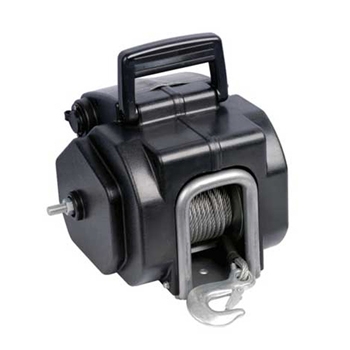When you're out on the water, whether you're fishing, cruising, or racing, there's one piece of equipment that can make life on the water much easier: the boat winch. If you're new to boating or have never needed to use one, you might be wondering: what exactly is a boat winch, and why is it so important? In this blog, Tool.com will explore what a boat winch is, how it works, and why you need one for your boating adventures.

Types of Boat Winches
- Manual Boat Winch: The most traditional type, a manual winch requires the user to turn a hand crank to wind the rope or cable and pull the boat onto the trailer. These winches are generally more affordable and are often found on smaller boats. They require physical effort, but they are reliable and simple to use.
- Electric Boat Winch: For larger boats or those who prefer convenience, an electric boat winch is a great option. Powered by a 12V or 24V battery, electric winches do all the hard work for you at the push of a button. These winches are faster and can handle heavier loads, making them ideal for larger vessels or for people who don't want to break a sweat.
- Hydraulic Boat Winch: A hydraulic winch is the most powerful option and is typically used for very large boats. Hydraulic systems use pressurized fluid to power the winch, making them capable of pulling very heavy loads with ease. These winches are common in professional settings and on larger boat trailers.
How Does a Boat Winch Work?
The boat winch operates by using a drum or spool around which a cable or rope is wound. The winch is either manually cranked or powered by an electric or hydraulic system to pull the rope and, in turn, the boat. Here's a simple breakdown of how it works:
- Attaching the Boat: First, you attach the winch's cable or rope to the bow of your boat. Typically, this is done using a hook or a strap, depending on the design of your winch.
- Pulling the Boat: Once the boat is properly secured, you engage the winch, either by turning the crank (manual winch) or pressing a button (electric winch). The winch begins to wind the rope or cable around its drum, pulling the boat onto the trailer.
- Securing the Boat: Once the boat is on the trailer, the winch is used to tighten the rope or cable to hold the boat in place. This ensures the boat is stable and won’t shift during transport. Some winches also come with a brake system that prevents the boat from moving once it’s secured.
Why Do You Need a Boat Winch?
A boat winch is an essential piece of equipment for boat owners for several reasons:
- Easy Launching and Retrieval: Without a winch, launching and retrieving your boat can be a challenging and time-consuming task, especially if you're boating solo or if the boat is large and heavy. A winch makes this process much faster and safer.
- Boat Safety: A winch helps prevent damage to your boat by ensuring that it's properly secured during loading and unloading. This prevents the boat from sliding off the trailer or getting damaged by the ramp.
- Convenience: With an electric or hydraulic winch, you can retrieve or launch your boat with little physical effort. This is especially useful if you're towing a larger vessel or launching from a steep ramp.
- Lifting Power: Manual winches offer plenty of lifting power, but for those with larger boats, electric and hydraulic winches provide extra muscle to lift boats that would otherwise be too heavy for a manual system.
Key Features to Consider When Buying a Boat Winch
When choosing the right boat winch for your needs, consider the following factors:
- Boat Size and Weight: The size and weight of your boat will determine the type of winch you need. Manual winches are suitable for smaller boats, while larger boats may require electric or hydraulic winches.
- Capacity: Winches come with different weight capacities. Ensure that the winch you choose can handle the weight of your boat plus any additional equipment that may be onboard.
- Ease of Use: Depending on how often you plan to launch and retrieve your boat, you may prefer the convenience of an electric or hydraulic winch over a manual one. Electric winches are especially helpful for those with limited physical strength or larger boats.
- Durability: Choose a winch that is durable and resistant to rust, especially if you'll be using it in saltwater conditions. Stainless steel or galvanized materials are commonly used for boat winches to prevent corrosion.
- Mounting Type: Ensure that the winch can be easily mounted on your boat trailer. Some winches are designed for specific trailer types, so check the specifications before buying.
Conclusion
A boat winch is a vital tool for boaters who want to make launching and retrieving their boats easier, safer, and more efficient. Whether you’re using a manual, electric, or hydraulic winch, this device helps ensure that your boat is safely and securely transported to and from the water. When purchasing a boat winch, make sure to choose one that is suitable for the size and weight of your boat, and consider additional features like durability, ease of use, and the winch's lifting capacity. With the right boat winch, you’ll be able to enjoy more time on the water and less time worrying about launching and retrieving your vessel.

